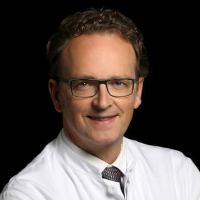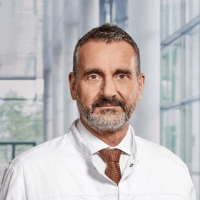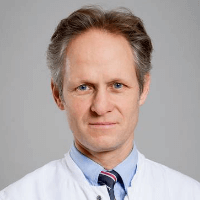Aortic Valve Stenosis with Transcatheter Aortic Valve Implantation (TAVI) in the Best Hospitals
Treatment prices are regulated by national law of the corresponding countries, but can also include additional hospital coefficients. In order to receive the individual cost calculation, please send us the request and medical records.

Department of Cardiothoracic Surgery
According to the Focus magazine, the Department of Cardiothoracic Surgery ranks among the top German medical facilities specializing in the surgical treatment of diseases of the cardiovascular system and lung cancer! The department offers the full range of surgical services for the treatment of diseases of the cardiovascular system, respiratory tract, including heart and lung transplantation, artificial heart implantation. The therapeutic options include aortic surgery, coronary artery bypass grafting, transplantation surgery, surgical treatment of heart rhythm disorders (arrhythmias), minimally invasive surgery, surgical treatment of the heart valves, including reconstructive interventions. All operations are performed using state-of-the-art technology and in accordance with the current recommendations of professional societies.






Department of Cardiothoracic Surgery and Vascular Surgery
The Department of Cardiothoracic Surgery and Vascular Surgery provides effective surgical treatment for diseases of the heart, respiratory system, and blood vessels. The team of cardiac surgeons operates on patients with heart valve pathologies, coronary heart disease, heart failure, and heart rhythm disturbances. In the field of thoracic surgery, the key focus is on the surgical removal of lung tumors and lung metastases. The specialists in this area also perform surgery to repair chest wall deformities. In the field of vascular surgery, interventions for abdominal and thoracic aortic aneurysms are most often performed here. The department's vascular surgeons are also exceptionally competent in the treatment of peripheral occlusive arterial disease. A great advantage for the department's patients is that almost all surgical interventions are performed using minimally invasive techniques, so there is no need for a long postoperative recovery. The department's operating rooms are equipped with state-of-the-art technology. This allows for effective and safe treatment. The priority is always personalized medical care for patients.







Department of Cardiothoracic Surgery
According to the Focus magazine, the Department of Cardiothoracic Surgery ranks among the top German medical institutions specializing in the surgical treatment of heart diseases! The department offers the full range of first-class medical care for patients with diseases of the heart and thoracic organs that require surgical treatment. The availability in the department of advanced technical base allows for the most sparing treatment and minimally invasive surgery. The main focuses of clinical practice include coronary artery bypass grafting, modern procedures for heart valve reconstruction and replacement, treatment of diseases of the thoracic aorta, as well as treatment of heart failure by implanting an artificial heart.






Heart valve disease is a common cause of shortness of breath and heart murmurs. It can be congenital or acquired.
Overview
The aortic valve is a tricuspid valve between the left heart ventricle and the aorta. Aortic stenosis is a narrowing of the aorta, the largest vessel in the body that carries oxygenated blood from the heart to all organs and tissues. This narrowing can occur at different levels. Depending on the localization of narrowing, the following types of aortic stenosis are distinguished: valvular (narrowing of the aortic valve), supravalvular (narrowing of the aorta itself), subvalvular (narrowing caused by excessive growth of the muscles of the left ventricle, which hampers blood flow into the aorta).
Normally, the aortic valve allows oxygenated (arterial) blood to flow freely from the left ventricle into the aorta, which carries blood to all organs and tissues of our body. The aortic valve has three cusps. When the left ventricle contracts, the valve flaps open completely and blood flows freely into the aorta. When the left ventricle relaxes and fills with arterial blood flowing from the lungs, the valve flaps close completely and prevent blood from flowing back from the aorta to the left ventricle. In heart valve disease, the valve leaflets partially adhere to each other, and their full opening becomes impossible.
Aortic stenosis occurs when valve opening is limited and the amount of blood that the left ventricle can pump into the aorta is reduced. Aortic stenosis, or narrowing of the aortic valve, is now the most common heart valve disease. In most cases, it affects the elderly, but in the case of the congenital bicuspid aortic valve, it can be severely narrowed already in people aged 20-40 years.
Untreated heart valve disease may not cause any symptoms. The clinical manifestations of heart valve disease depend on the severity of the narrowing. In patients with pronounced (critical) stenosis, in whom the heart works against great resistance, the symptoms are expressed. These patients have rapid breathing and a high heart rate. In the most severe cases, these patients may require mechanical ventilation and treatments in the intensive care unit. They should undergo urgent endovascular or surgical treatments.
Symptoms
Aortic stenosis usually does not develop immediately, which makes it difficult to diagnose at the early stages. Also, patients may simply not understand what they are experiencing.
Aortic stenosis can be mild or severe. Signs and symptoms of aortic stenosis usually develop when the narrowing is severe and may include:
- Chest pain (angina)
- Feeling weak or fainting during the physical exertion
- Shortness of breath, especially during the physical exertion
- Fatigue, especially during periods of increased activity
- Rapid heartbeat – a feeling of fast heartbeat, fluttering heart
- Heart murmurs
The influence of aortic stenosis on the heart can lead to the development of heart failure. Symptoms of heart failure include fatigue, shortness of breath, and swollen ankles and feet.
The condition is often diagnosed during a routine check-up, when the doctor hears an abnormal heart sound (heart murmur). This murmur can be heard long before other signs and symptoms appear.
Depending on the degree of constriction, a patient with aortic stenosis may not have any symptoms, although tire more quickly, or feel chest pain during increased physical activity.
Congenital aortic stenosis is usually asymptomatic until 10-20 years of age, after which symptoms progress rapidly. In all forms, progressive aortic stenosis without treatment ultimately leads to fainting during exercise, angina pectoris, and shortness of breath. Other manifestations of aortic stenosis include signs of heart failure and arrhythmias, ventricular fibrillation, and may lead to sudden death.
Treatment
Aortic valve replacement is the main treatment for aortic valve stenosis – a partial narrowing of the lumen of the aortic valve, causing difficulty in the outflow of blood from the left ventricle of the heart to the aorta, which supplies blood to the entire body. Symptoms of this disease include severe shortness of breath, chest pain during intense physical activity, and increased fatigue. The most serious complication in patients with severe valve narrowing is sudden cardiac death.
The goal of aortic valve replacement is to relieve excessive stress on the heart muscle. Thus, the patient's health is restored, the well-being and quality of life improve. As a rule, patients with acute health conditions are referred for surgical treatments. On the other hand, a patient without pronounced symptoms and with a preserved pumping function of the heart or ventricular hypertrophy may be prescribed preventive procedures before the onset of symptoms or the development of irreversible damage to the heart muscle.
In most cases, the aortic valve replacement procedure involves opening the chest and using a heart-lung machine. Some technologies allow intervention to be performed with a partial opening of the chest or through an intercostal incision.
Until recently, aortic valve replacement was performed only in an open way, that is, with opening the chest, under general anesthesia, with the artificial circulation. Naturally, after such surgery, the patient needs a long rehabilitation. Now there is an alternative technique – transcatheter aortic valve replacement (TAVI), which allows restoring the heart function and returning the patient to a normal life.
Certain defects, especially aortic valve stenosis, can be treated with the help of a catheter inserted into an artery in the groin (transcatheter aortic valve implantation – TAVI). The patient's heart itself provides blood circulation during such an intervention, including during manipulations with the valve. The doctor selects the safest and best for the patient option of surgical treatment, thoroughly informing the patient about it.
In the case of transcatheter aortic valve replacement (TAVI), the replacement procedure is performed without making large surgical incisions, through a puncture of the femoral artery. It is carried out under X-ray control, without artificial circulation and general anesthesia. One of the advantages of transcatheter aortic valve replacement is the ability to reduce the side effects of sternum dissection, i.e. blood loss, pain during a patient's stay in the hospital, and the risk of infection associated with a postoperative suture. The use of endovascular technologies significantly reduces the rehabilitation period of patients.
Transcatheter aortic valve replacement is the sparing procedure, that is performed on a beating heart, without incisions, by puncture of the artery. Transcatheter aortic valve replacement (TAVI) helps to quickly restore the heart in case of aortic valve lesions.
Transcatheter aortic valve replacement (TAVI) is indicated to those patients whose aortic valve is affected severely for some reason. Previously, if a patient could not undergo an operation to replace a valve on an open heart, for example, due to age, then doctors had nothing to offer him. The transcatheter aortic valve replacement (TAVI) provides therapy for patients with aortic valve stenosis in a less traumatic way, and without anesthesia – with the help of conscious sedation.
TAVI, transcatheter aortic valve replacement is the optimal technique of surgical treatment for elderly patients with aortic valve stenosis with a high risk of mortality during traditional surgical correction of the defect.
Transcatheter aortic valve replacement (TAVI) is used in cases when the conventional "open" intervention is associated with high surgical risks. Transcatheter aortic valve replacement (TAVI) is indicated to patients with heart valve disease who suffer from severe concomitant diseases, e.g. vascular lesions, chronic diseases of the lungs, liver, endocrine pathologies, oncology, etc.
How transcatheter aortic valve replacement is carried out?
Before transcatheter aortic valve replacement procedure patients need to undergo an examination to exclude inflammation and other pathological processes in the body. The inflammation should be treated before planning the transcatheter aortic valve replacement procedure so that it does not spread to the heart. Quitting smoking reduces the risk of breathing problems and makes the anesthesia during transcatheter aortic valve replacement procedure safer. If patients are overweight, they should try to lose some weight, as this will reduce the risks associated with anesthesia and facilitate the recovery process after the transcatheter aortic valve replacement procedure.
If necessary, patients need to undergo additional tests before the transcatheter aortic valve replacement procedure: ECG, computed tomography of the heart, coronarography, echocardiography, TEE, and blood tests to check the patient's general health condition.
ECG (electrocardiography) records the electrical activity of the heart. Computed tomography allows doctors to take more detailed pictures of the heart and blood vessels. SCG (selective coronarography) visualizes blood vessels of the heart in order to determine the degree of their damage. Echocardiography is an ultrasound scanning that can be used to see how different parts of the heart work. If the visualization is not good enough, an ultrasound examination through the esophagus (TEE) is performed. TEE (transesophageal echocardiography) is an ultrasound scanning through the esophagus that gives a good view of the heart structures.
If patients are taking blood thinners, doctors will inform patients about peculiarities of their use before transcatheter aortic valve replacement procedure. Patients will be admitted to the hospital 1-3 days before the transcatheter aortic valve replacement procedure.
The transcatheter aortic valve replacement procedure lasts about three hours. During the transcatheter aortic valve replacement procedure, patients are under the action of general anesthesia and do not feel pain. The heart and blood pressure are monitored during the transcatheter aortic valve replacement and medications are administered as needed.
After the transcatheter aortic valve replacement, patients are transferred to an intensive care unit for observation. Once they wake up from anesthesia and can breathe, a breathing tube is removed. For the first six hours, the patient should lie on the back with the legs straight. This is very important to prevent bleeding in the groin area.
The patient can be socially active, as rehabilitation after transcatheter aortic valve replacement is minimal.
Moreover, transcatheter aortic valve replacement is suitable for patients with critical narrowing of the aortic opening of the heart, with severe concomitant pathologies.
Where can I undergo treatment abroad with transcatheter aortic valve implantation (TAVI)?
Medical tourism is becoming more and more popular these days, as treatment abroad often ensures a much better quality of transcatheter aortic valve implantation (TAVI).
The following world’s and European hospitals show the best success rates in transcatheter aortic valve implantation (TAVI):
- University Hospital Essen, Germany
- University Hospital Oldenburg, Germany
- Medipol Mega University Hospital Istanbul, Turkey
- University Hospital Ulm, Germany
- University Hospital Frankfurt am Main, Germany
You can find more information about the world’s and European hospitals on the Booking Health website.
The cost of treatment abroad with transcatheter aortic valve implantation (TAVI)
The prices in world’s and European hospitals listed on the Booking Health website are relatively low. With Booking Health, you can undergo treatment abroad with transcatheter aortic valve implantation (TAVI) at an affordable price.
The cost of treatment abroad varies, as the prices depend on the hospital, the specifics of the disease, and the complexity of its treatment.
The cost of treatment of aortic valve stenosis with transcatheter aortic valve implantation (TAVI) in Germany starts with 32,824 EUR.
The cost of treatment of aortic valve stenosis with transcatheter aortic valve implantation (TAVI) in Turkey starts with 28,397 EUR.
You might want to consider the prices of additional medical procedures and follow-up care. Therefore, the ultimate cost of treatment in European hospitals may differ from the initial price.
To find out information about the overall cost of treatment abroad, contact us by leaving the request on the Booking Health website.
How can I undergo treatment abroad with transcatheter aortic valve implantation (TAVI)?
It is not easy to self-organize any treatment abroad. It requires certain knowledge and expertise. Thus, it is safer, easier, and less stressful to use the services of a medical tourism agency.
As the largest and most transparent medical tourism agency in the world, Booking Health has up-to-date information about transcatheter aortic valve implantation (TAVI) in the best world’s and European hospitals. We will help you select the right medical center taking into account your wishes for treatment.
We want to help you and take on all the troubles. You can be free of unnecessary stress, while Booking Health takes care of all organizational issues regarding the treatment abroad with transcatheter aortic valve implantation (TAVI). We provide our services so that you can undergo transcatheter aortic valve implantation (TAVI) safely and successfully.
Medical tourism can be easy! All you need to do is to leave a request on the Booking Health website, and our manager will contact you shortly.

